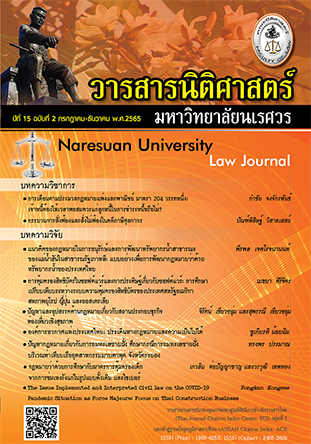The Legal Concept of Han River Conservation and Development in Republic of Korea: A Model for Developing Thai Water Resources Law
Main Article Content
Abstract
This research has its key objective of exploring the concept of Hun River conservation and development embedded in the Republic of Korea’s water law as a possible model for legal development of Thai water legislation because Thailand has recently promulgated its first water resources law, Water Resources Act B.E. 2561, which enables water resources to be conserved and developed effectively under legal measures. However, this issue is new and also need to be materialized through lessons learned from an appropriate foreign law. The research found that the concept of Republic of Korea’s water law would possibly facilitate Thai legislators to comprehend and crystalize their own idea to develop water resources conservation and development law. The findings were exposed with an analysis of the concept of Republic of Korea’s water law based on the same legal system as that of Thailand, the establishment of water conservation and development zone, the designation of legal measures to protect water resources, both its quality and quantity, from any actions. The use of properties surrounding water resources and application of public participation to water development are included. These, hence, would be productive to provide recommendations towards Thai water law development.
Article Details
References
Central Intelligence Agency. “The World Factbook: Thailand.” Accessed March 5, 2022. https://www.cia.gov/the-world-factbook/countries/thailand/#economy.
Cha, Yoon Jung et al. “The Four Major Rivers Restoration Project.” In The UN-Water Water International Conference: Water in the Green Economy in Practice Towards RIO+20. Zaragoza, 3-5. Spain: UN-Water Water International Conference, 2011.
Choi, Ik-Chang et al. “Water Policy Reforms in South Korea: A Historical Review and Ongoing Challenges for Sustainable Water Governance and Management.” Water 9, no.9 (2017): 1-20.
Kim, Hwa Young, et al. Water Resources Management in Republic of Korea: Korea’s Challenge to Flood & Drought with Multi-Purpose Dam and Multi-Regional Water Supply System. Washington, DC: Inter-American Development Bank, 2018.
Korea Water Resources Corporation. “About K-Water: Overview.” Accessed April 2, 2021. http://english.kwater.or.kr/eng/about/sub02/kwaterPage.do?s_mid=1099.
Ministry of Environment. Water Management in Korea: Experiences and Achievements.N.p.: Ministry of Environment, 2017.
Ministry of Government Legislation. “National Law Information Centre: Korean Legislative System and Procedures.” Accessed January 8, 2022. https://law.go.kr/LSW/eng/engAbout.do?menuId=3.
Organization for Economic Co-operation and Development. “Sustaining the Miracle on the Han River.” Accessed October 25, 2021. https://www.oecd.org/country/korea/thematic-focus/sustaining-the-miracle-on-the-han-river-103653fa/.
Urban Planning Bureau of Seoul Metropolitan Government. Urban Planning of Seoul. Seoul: Seoul Metropolitan Government, 2016.


